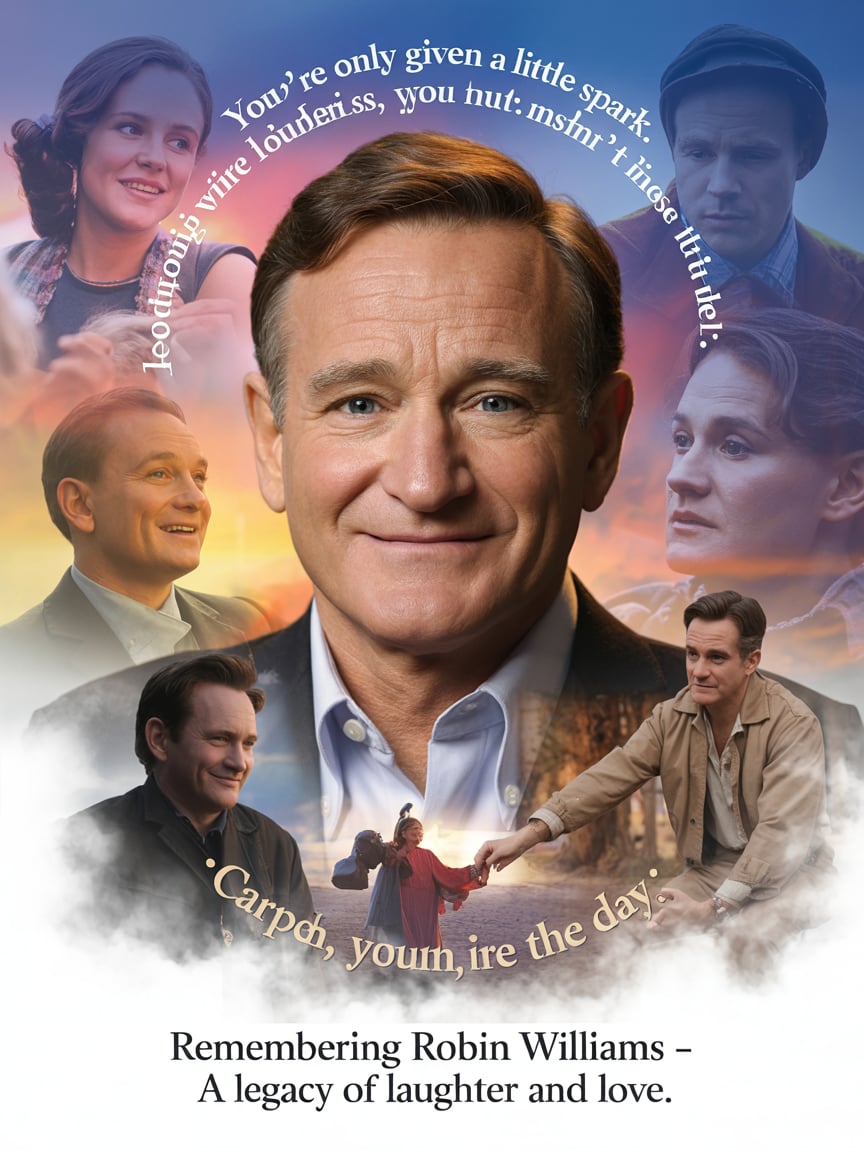Remembering Robin Williams: A Legacy of Laughter and Humanity

Few actors in cinematic history have left as profound an impact as Robin Williams. His ability to switch seamlessly between uproarious comedy and heartbreaking drama made him one of the most beloved performers of all time. From the whimsical chaos of “Mrs. Doubtfire” to the soul-stirring moments in “Dead Poets Society,” Williams’ legacy is a rich tapestry of emotional resonance and unforgettable characters. In this article, we will delve into the life, career, and enduring influence of a man who didn’t just entertain us—he inspired us.
Early Life and Career Beginnings
Robin McLaurin Williams was born on July 21, 1951, in Chicago, Illinois. His father was an executive at Ford Motor Company, and his mother was a former model. Despite coming from an affluent background, Williams often described his childhood as lonely. He found solace in his imagination and developed a flair for impersonations and comedic voices at a young age.
Williams studied theater at Juilliard School, where he was one of only two students accepted into John Houseman’s advanced program in 1973. His time at Juilliard helped him refine his craft and develop the dynamic range that would later define his career.
Breakthrough with “Mork & Mindy”
Robin’s breakout role came in 1978 with the TV show “Mork & Mindy,” where he played an eccentric alien from the planet Ork. His improvisational skills and boundless energy turned what could have been a throwaway sitcom into a cultural phenomenon. The show catapulted him to national fame and showcased his extraordinary comedic talent.
Iconic Film Roles
Williams’ transition from television to film was marked by a series of iconic roles that demonstrated his remarkable versatility:
- “Good Morning, Vietnam” (1987): Portraying radio DJ Adrian Cronauer, Williams brought humor to the Vietnam War setting, blending improvisational comedy with deeper emotional themes. The role earned him his first Academy Award nomination.
- “Dead Poets Society” (1989): As English teacher John Keating, Williams delivered one of the most inspiring performances of his career. The line “Carpe diem. Seize the day, boys. Make your lives extraordinary,” became a generational mantra.
- “Mrs. Doubtfire” (1993): In this family comedy, Williams played a father who disguises himself as a Scottish nanny to spend time with his children. His physical comedy and emotional depth turned the film into a beloved classic.
- “Good Will Hunting” (1997): This role earned him his first and only Oscar for Best Supporting Actor. As therapist Sean Maguire, Williams delivered a quietly powerful performance that highlighted his dramatic capabilities.
- “Aladdin” (1992): Though animated, his portrayal of the Genie in Disney’s “Aladdin” is one of his most enduring roles. His rapid-fire voice work and heartfelt delivery brought the character to life in a way only he could.
The Genius of Improvisation
One of Robin Williams’ most extraordinary talents was his improvisation. Directors often let the cameras roll, knowing that Williams’ spontaneous creativity would lead to gold. Whether it was ad-libbing in “Aladdin” or riffing in “Good Morning, Vietnam,” his mind worked at a speed few could match.
He could shift accents, characters, and tones within seconds, often improvising entire scenes or reshaping dialogue to fit his unique style. This improvisational skill not only made his performances unpredictable but deeply human.
Personal Struggles Behind the Laughter
Despite his outward exuberance, Williams battled personal demons. He struggled with addiction throughout his life and was open about his experiences with substance abuse and depression. His ability to bring joy to millions stood in poignant contrast to his internal battles.
In 2014, Robin Williams passed away at the age of 63. His death shocked the world and opened up a global conversation about mental health, depression, and the importance of support systems. It was later revealed that he had been suffering from Lewy body dementia, a debilitating neurological disease that had gone undiagnosed.
Impact on Pop Culture and Generations of Fans
Robin Williams’ influence is far-reaching. His movies are still quoted today, his characters still beloved, and his performances still studied in acting classes. Lines like “Oh captain, my captain,” and “You’re only given a little spark of madness. You mustn’t lose it,” resonate with audiences of all ages.
He was a unique blend of intellect, sensitivity, and humor. Whether making us laugh uncontrollably or bringing us to tears, Robin Williams tapped into the core of what it means to be human. His humor was never just about the joke—it was about connection.
Tributes and Legacy
In the wake of his passing, tributes poured in from fans, fellow actors, comedians, and world leaders. The Academy of Motion Picture Arts and Sciences honored him with a heartfelt image of the Genie from “Aladdin” saying, “Genie, you’re free.” That single line captured the collective mourning and reverence felt around the globe.
Parks, scholarships, and foundations have been named in his honor, and documentaries have been made to chronicle his life and contributions. His children, particularly Zelda Williams, continue to speak out about mental health in his memory.
Conclusion: A Life That Continues to Inspire
Robin Williams was more than a comedian, more than an actor—he was a force of nature, a deeply empathetic soul who used his gifts to lift others. His ability to walk the line between comedy and tragedy, light and dark, makes his work timeless.
To think of Robin Williams is to remember joy, compassion, brilliance, and above all, humanity. His films remain a refuge for those seeking laughter or comfort. And in a world often clouded by darkness, his light continues to shine.
As we reflect on the question, “What’s the first movie that comes to mind when you see Robin Williams?” — the answer is less about a title and more about a feeling: warmth, wisdom, and wonder.
He may be gone, but Robin Williams will never be forgotten.
Rest in peace, O Captain. Our Captain.













